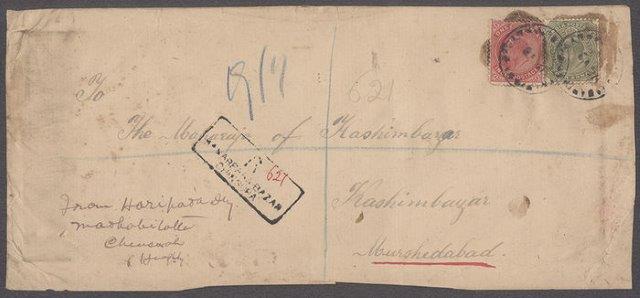This Lot is closed.
- P-Auction # 20
- Bids: 2
- Views:771
| Start Price 7500 | Estimated Price 7500-10000 |
| login, to view Hammer value | |
| Quick Description | ||||
|---|---|---|---|---|
| Metal | Stamps | |||
| Full Description: Edward VII, Registered Envelope, 1a, & 4a, Addressed to "The Maharaja of Kashimbazar, Murshedabad ", 2nd Delay 19 NOV, Registered Post Seal "SAARAFA BAZAR, Chuchura”, Good Condition, Rare. Portuguese founded the town of Chuchura (Hooghly) in 1579, but the district has thousands of years of heritage in the form of the great kingdom of Bhurshut. The city flourished as a trading port and some religious structures were built. One such structure is a Christian church dedicated to a statue of Mary, brought by the Portuguese. In the 17th century, political disorder struck the city and the Mughal governor of Bengal expelled the Portuguese. The fleeing Portuguese lost the statue in the river, but local people later found it on the river bank. The arrested Portuguese were taken to Delhi, where a death sentence of trampling by elephants was decreed. When the emperor Shah Jahan heard this he ordered the priests released and granted a piece of land on the bank of the river Hooghly, where the statue of Mary was re-established. There the Portuguese constructed a church to house the statue, which still receives pilgrims today. In 1656 the Dutch erected a factory on the site of the town. At that time Calcutta was the principal settlement in Dutch Bengal, who used it as a base for the Dutch intra-Asian opium trade. In 1759 the garrison of Chinsura, on its march to Chandernagore, attacked a British force under Colonel Forde. The Battle of Chinsurah lasted less than half an hour and ended with the rout of the Dutch attackers. In 1795, during the Napoleonic wars, a British garrison occupied the settlement. The peace of 1814 restored Hughli to the Dutch. However, in 1825, the Dutch ceded many of their possession in India to the British, in exchange for the British possessions in Sumatra. Both Chinsurah and Hooghly played a role in the Bengal renaissance and the Indian independence movement. "Vande Mataram", India's national song, was composed by Bankim Chandra Chattopadhyay at Joraghat in Chinsurah, who had been an alumnus of the Hooghly Collegiate School. Nazrul Islam's revolutionary songs were penned while he was imprisoned by the British in Hooghly Jail. | ||||


